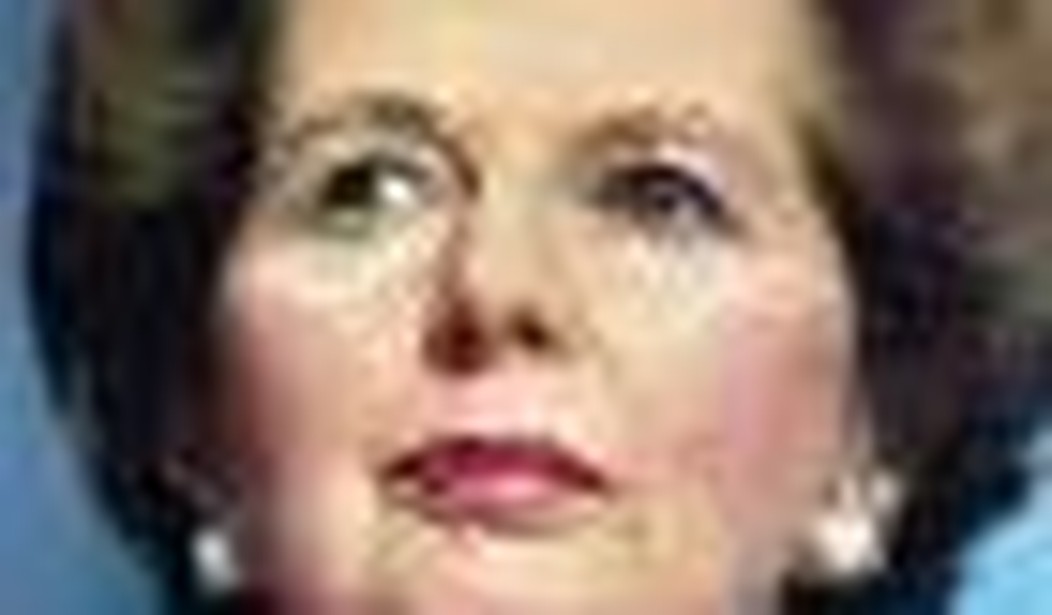The cover of Newsweek recently announced that it’s the end of the era of Thatcher. The Washington Post followed suit. These headlines suggest a very significant confusion about what, precisely, Margaret Thatcher stood for. They are an injustice to her legacy.
It is true that Thatcher promoted deregulation. But the deregulation she favored had nothing to do with the meltdown on Wall Street. She was certainly not an advocate of regulation-free capitalism, as these headlines imply: No free-market economist in his right mind asserts that there should be no regulations or laws whatsoever. In fact, contract law and certain kinds of regulation — remember that “regulation” is just another word for “law” — are fully understood by free-market enthusiasts to be essential to the functioning of a free-market economy.
No one connected to Thatcher would have dreamt of disputing this.
Thatcher’s point was that the laws and regulations on the books must be good ones. Thus did she favor removing regulations that massively burdened the British economy. But at the same time, she was a passionate proponent of the kind of regulation that makes free markets function properly. Those who say Thatcherite deregulation has been discredited never say which regulations and laws shouldn’t have been passed during her time in power, or which ones should have been, and when. They don’t say so because the laws and regulations she did promote were good ones and remain good.
The exotic financial instruments now widely regarded as the cause of the subprime mortgage crisis hadn’t been invented when she and her team took power. It makes no more sense to blame Thatcher for having failed to regulate them than it does to blame Lincoln for the rise of al-Qaeda.
So what kind of deregulation did Thatcher actually promote, and what does this suggest about her beliefs?
In 1983, Thatcher’s government eliminated the foreign exchange controls that had been in place since the Second World War.
In 1986, in an event known as the Big Bang, her government opened the stock market to foreign and domestic traders. British investors became free to seek the best rates of return abroad, and foreign investors were in turn free to invest in Britain. Her government simultaneously eliminated the separation of brokers and jobbers on the London Stock Exchange, abolished the fixed minimum commissions for buying and selling securities, and eliminated restrictions on ownership and membership of the Stock Exchange by outside corporations. That’s what “Thatcherite deregulation” comes down to.
No one is seriously suggesting, now, that these reforms — which made London the financial capital of the world for the next two decades — were a mistake; no one can credibly connect them to the meltdown on Wall Street, and no one is proposing to reverse them. Were you now to propose solving the banking crisis by reinstating currency controls, you would be widely and properly regarded as a loon. No one ever points to a specific Thatcherite regulatory reform that can be connected to the current crisis, and that’s because there wasn’t one. “She made people feel greedy” is not an adequate answer. People have been greedy since the Garden of Eden.
Another key point, painfully overlooked: Thatcher was in fact a proponent of quite stringent bank regulation, as evidenced by the 1986 Financial Services Act, which closed loopholes in laws designed to protect investors, established a comprehensive regulatory apparatus to ensure these regulations were enforced, and widened the purview of laws designed to protect investors so that they applied to a broader range of securities and investments. This is hardly the sort of legislation we would expect to see passed were Thatcher truly a wild-eyed ideologue who believed lawlessness itself would lead to prosperity.
Under Thatcher, credit growth was controlled through the money supply and by allowing banks to lend within carefully adjusted parameters. She would have been appalled by the unregulated explosion of leverage in Western economies that followed her time in power: philosophically, the hyperleveraging of the economy was against everything she stood for and everything that, in fact, she and her successive chancellors did.
This is evident from scores and scores of her speeches, policy documents, and decisions in government. She was willing to withstand enormous criticism precisely because she would not deviate from her belief that an economy must be based on the housewifely principles of thrift, common sense, and living within ones means. In this, she may have been, as her critics often charged, economically naive and simplistic, but she was nonetheless perfectly clear.
The economic policies for which Thatcher is best known — and which wrenched Britain from a trajectory of permanent decline — have not been discredited by this crisis and indeed are completely separate issues. Britain was essentially a socialist state before Thatcher, with top rates of taxation of 98 percent. That number is not a typo. The country was an economic basket case: It was the second-poorest country in Europe. Even the Soviet Union was reluctant to trade with Britain because British goods were unreliable and British workers were always on strike. Thatcher is known for denationalizing the commanding heights of British industry, taking on and weakening Britain’s overweeningly powerful trade unions, curtailing government spending, advocating sound money, and promoting a business-friendly tax environment. Her reforms led to the longest sustained period of British economic expansion of the postwar era, with Britain in the past decade ranking top in both output and inflation stabilization in the OECD.
Nothing in the recent crisis detracts from this or suggests that her reforms were misguided — or that their lessons are no longer relevant. They are very relevant. Both candidates for the presidency would be wise to consider them closely as they consider not only the banking crisis, but other economic policy issues under debate, such as the Employee Free Choice Act. Unfortunately, neither candidate seems to possess even a rudimentary understanding of what she did and what this suggests for us now. And neither do those who say the era of Thatcher is over.









Join the conversation as a VIP Member